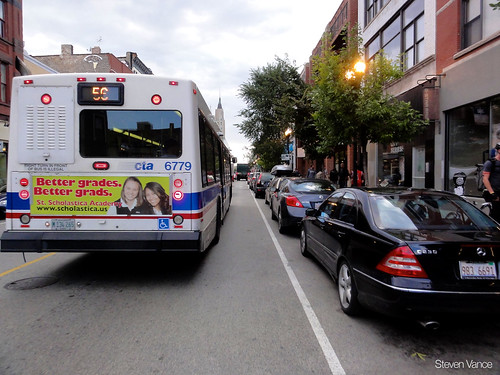Keith Griffith is a Chicago-based freelance writer and arts critic.
Last October, while the dregs of Superstorm Sandy drifted over Chicago, Lilly was lying in the trauma unit at Northwestern Memorial. (For anonymity, she that asked we only use her nickname.) She’d been doored on Lincoln Avenue on her morning bike commute, and now doctors were swarming around her, trying to determine if her pregnancy, then five months along, was at risk.
That’s when the police officer who had responded at the crash scene walked in to drop off the incident report and to let Lilly, 30, know that — by the way — she was at fault for the crash. Her heart-rate monitor began beeping furiously — how could she be at fault? She’d been riding in the shared lane on Lincoln, passing between the line of stopped traffic and the line of parked cars, when a passenger in one of the cars idling in the traffic lane swung his door open straight into her bike, sending her spinning into the pavement.
State and local law, as it turns out, are ambiguous about this scenario. A section presumably written to prevent motorcycles from roaring down the shoulder of roads has been used to find cyclists at fault in traffic-lane doorings. It’s a rare but potentially serious issue — Lilly, who is expecting a healthy baby girl in March, is now in a legal battle over her medical fees. In 2010, California’s legislature revised their passing-on-right statute to fix its ambiguity, and now Illinois advocacy groups are gearing up to push for a similar change at home.
“This is one of the dumber laws that’s applied to bicyclists,” said local attorney Jim Freeman (a Streetsblog Chicago sponsor), who has represented clients cited for passing on the right. He’s talking about section 11-704(b) of the Illinois Vehicle Code, which reads in part:
The driver of a 2 wheeled vehicle may not pass upon the right of any other vehicle proceeding in the same direction unless the unobstructed pavement to the right of the vehicle being passed is of a width of not less than 8 feet.
Bikes aren’t included in the code’s definition of “vehicle,” but elsewhere the code requires cyclists to follow the same rules as vehicles, except when the laws “by their nature can have no application.” Chicago’s municipal vehicle code is similarly worded.
Whether 11-704(b) can apply to bikes “by its nature” is up for debate, since there’s no clear precedent in case law, according to Freeman. But Chicago attorney Brendan Kevenides (also a Streetsblog Chicago sponsor) believes that from a common sense perspective, it makes no sense to apply the restriction to bikes. He wrote about the subject on his blog.
“If this section is applied to bicycles, it would completely turn the whole concept of ‘share the road’ on its head,” he told me. “What would happen if bicycles were not allowed to travel along the right, or pass along the right?”
Chicago police do selectively enforce the law for bikes, though. Amy Malick, a city employee, told me she was ticketed for passing on the right in 2006 after a traffic-lane dooring incident similar to Lilly’s. The citation was dismissed by the circuit court judge when she appeared, Malick says. CPD and CDOT spokespersons did not respond to requests for comment.
With such ambiguity around the law, advocacy groups are gearing up to seek a clarifying revision from the state legislature and city government. “This issue is pretty high on our list for 2013,” said League of Illinois Bicyclists Executive Director Ed Barsotti. “We’re probably going to look at where Illinois law is compared to other states on this and see if we need a change.” For the first time this year, the league’s bike-law handouts will reference the passing-on-right restriction in an effort to educate cyclists about the unusual law.
Amanda Woodall, policy manager at Active Transportation Alliance, says the advocacy group has studied the issue closely. “The double standard that we see is that bicycles are required to ride as far to the right as practicable,” she said. “They want bicycles on the right when cars are moving, and on the left when cars are stopped ... We would certainly advocate for the municipal code and the state law to be amended.”
Facing a similar ambiguity, California’s state legislature revised their vehicle code in 2010 to specifically exclude bicycles from the passing restriction. “When you have other states as examples to point to, that makes it a lot easier” to change the law, said Barsotti.
Lilly, who has fully recovered from her crash, has her own idea to spur legislators to revise the law. “I want to plan a day of civil obedience,” she told me. “We could get a huge group of cyclists and ride down Lincoln exactly how we’re supposed to, and see how that goes over with drivers. Let’s just sit in traffic and not pass them at lights, and see how they like that.”







